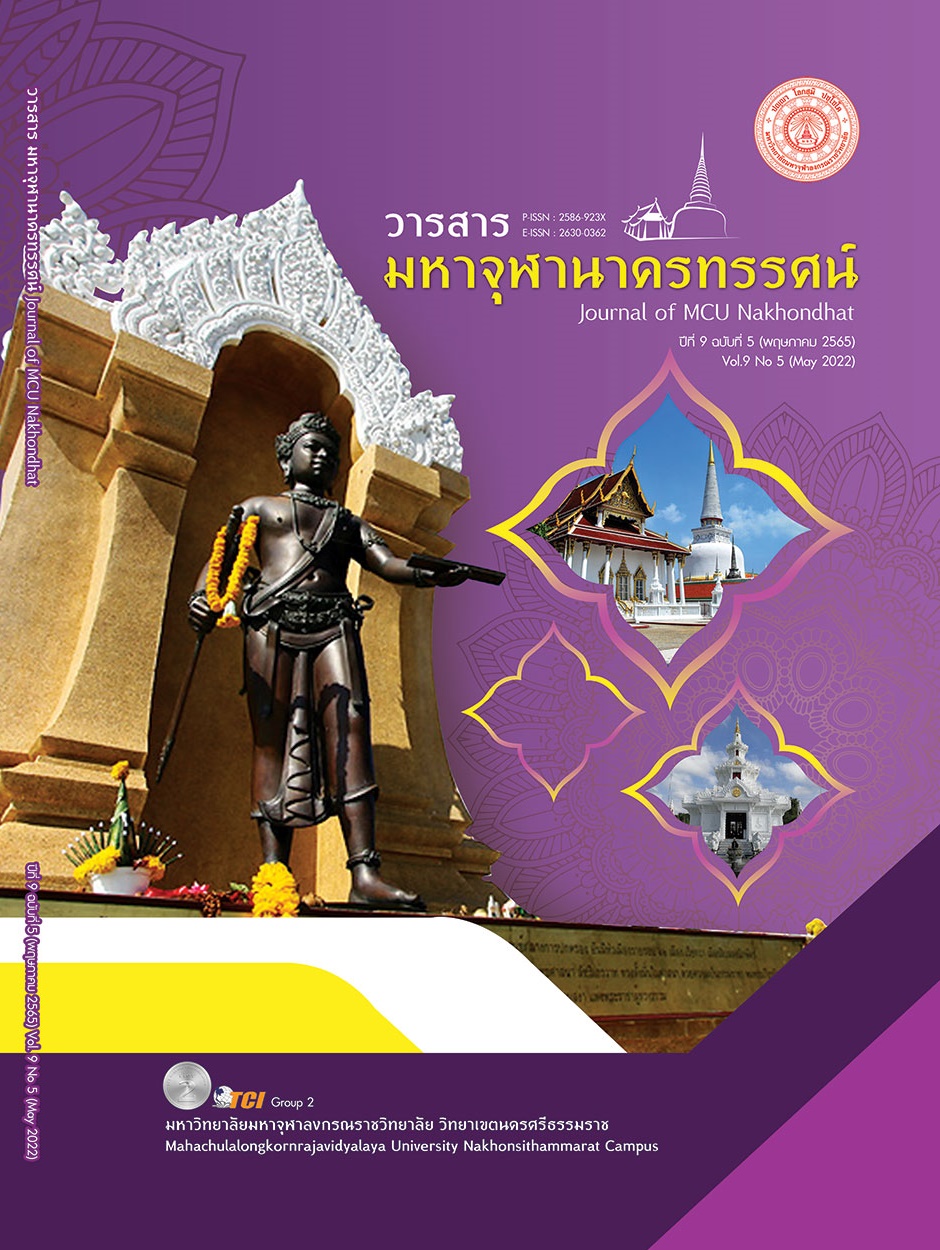A CONFIRMATORY FACTOR ANALYSIS OF THE DESIRABLE CHARACTERISTICS OF PRESCHOOL TEACHER
Main Article Content
Abstract
The purposes of this research were to study the desirable characteristics of preschool teacher according to the teachers’ views and to analyze the confirmatory factors of the desirable characteristics of preschool teacher. A sample used in the research included 161 preschool teachers in schools under the office of the Phitsanulok Primary Educational Service Area Office 1. The instrument used in the research was a 5 - level – rating scale opinion questionnaire with a confidence level at 0.904. To Analyze the data based on descriptive statistics and reference statistics used basic statistical analyzing package software and used LISREL 8.8 for confirmatory factors analysis. The findings found that 1) Overall of the desirable characteristics of the preschool teacher according to the teachers’ views was rated in most important level and by aspects consideration found that the 3 - highest ranked desirable characteristics of the preschool teacher were morality and ethics, personality and academic. 2) The confirmatory factor analysis result of the desirable characteristics of preschool teacher was shown the consistency with the empirical data while the fitted measurements were Chi - square = 0.96, df = 2, p – value = 0.61894, RMSEA = 0.000, GFI = 0.998, AGFI = 0.982 with positive significance weights of factors by statistically significant level at 0.01 in every aspect and the range between 0.655 to 0.972. The factor with highest significance weight was academic, followings were work readiness, learning management skills, morality and ethics and personality respectively. As a result, the 5 factors of the desirable characteristics of the teacher effect to efficiency of early childhood development and learning skills in order to achieve quality population.
Article Details

This work is licensed under a Creative Commons Attribution-NonCommercial-NoDerivatives 4.0 International License.
References
กุลยา ตันติผลาชีวะ. (2540). รายงานการวิจัยเรื่องบทบาทครูปฐมวัยในทศวรรษหน้า. วารสารการศึกษาปฐมวัย, 1(3), 63-73.
คุรุสภา. (2556). ข้อบังคับคุรุสภาว่าด้วยมาตรฐานวิชาชีพ. เรียกใช้เมื่อ 8 มกราคม 2560 จาก http://www.educ.su.ac.th/images/curriculum/
จีระพันธุ์ พูลพัฒน์. (2555). การศึกษาคุณลักษณะสำคัญของครูปฐมวัยตามการรับรู้ของนิสิตชั้นปีที่ 4. วารสารครุศาสตร์, 39(2), 1-10.
เฝาชี ล่าเต๊ะ. (2564). ละเมิดสิทธิหนูทำไม...เสียงเล็กๆที่ถูกมองข้ามในสังคมไทย. เรียกใช้เมื่อ 20 มกราคม 2565 จาก https://www.amnesty.or.th/latest/blog/865/
ประกฤติยา ทักษิโณ. (2559). เอกสารประกอบการอบรมเรื่อง การวิเคราะห์ข้อมูลด้วย LISREL และ MPLUS ความรู้พื้นฐานก่อนการวิเคราะห์. ขอนแก่น: มหาวิทยาลัยขอนแก่น.
พิทักษ์ โสตถยาคม และคณะ. (2561). ปัจจัยเงื่อนไขการจัดเรียนรู้ของครู มุมมองของครูผู้นำและผู้บริหารโรงเรียน. Veridien E-Journal Silpakorn University ฉบับภาษาไทย สาขามนุษยศาสตร์ สังคมศาสตร์และศิลปะ, 11(1), 759-772.
พระเทพวิสุทธิเมธี (พุทธทาสภิกขุ). (2546). ธรรมสำหรับครู. กรุงเทพมหานคร: สานอักษร.
พรทิพย์ เอี่ยมประเสริฐ และคณะ. (2556). การศึกษาปัจจัยที่ส่งผลต่อสมรรถนะในการจัดประสบการณ์การเรียนรู้ของครูปฐมวัย สังกัดสำนักงานคณะกรรมการส่งเสริมการศึกษาเอกชน กรุงเทพมหานคร. การประชุมสัมมนาการบริหารศึกษาระดับชาติ ครั้งที่ 1 มหาวิทยาลัยศรีนครินทรวิโรฒ.
กระทรวงศึกษาธิการ. (2560). หลักสูตรการศึกษาปฐมวัย พุทธศักราช 2560. กรุงเทพมหานคร: โรงพิมพ์สหกรณ์การเกษตรแห่งประเทศไทย.
กระทรวงศึกษาธิการ. (2563). นโยบายและแนวปฏิบัติในการจัดการศึกษาและการเรียนรู้สำหรับเด็กปฐมวัย. เรียกใช้เมื่อ 17 พฤษภาคม 2564 จากhttps://moe360.blog/2020 /09/23/early-childhood/
ศรีสุดา นามจิต และคณะ. (2554). คุณลักษณะที่พึงประสงค์ของครูปฐมวัยในโรงเรียนสังกัดสำนักงานเขตพื้นที่การศึกษาในจังหวัดนครพนม. วารสารมหาวิทยาลัยนครพนม, 1(1), 35-40.
สิริมา ภิญโญอนันตพงษ์. (2560). เอกสารประกอบการสอนรายวิชา ECED 201 การศึกษาปฐมวัย. โครงการความร่วมมือระหว่างมหาวิทยาลัยราชภัฏสวนดุสิตกับกรมส่งเสริมการปกครองท้องถิ่น. กรุงเทพมหานคร: มหาวิทยาลัยราชภัฏสวนดุสิต.
สุนทร เทียนงาม. (2559). การวิเคราะห์เชิงสาเหตุปัจจัยที่ส่งผลต่อคุณลักษณะความเป็นครูปฐมวัยใน
ศตวรรษที่ 21 ของนักศึกษาหลักสูตรการศึกษาปฐมวัย. วารสารศิลปากรศึกษาศาสตร์วิจัย, 8(1), 90-106.
สุวิมล ติรกานันท์. (2553). การวิเคราะห์ตัวแปรพหุในงานวิจัยทางสังคมศาสตร์. กรุงเทพมหานคร: โรงพิมพ์แห่งจุฬาลงกรณ์มหาวิทยาลัย.
องค์การยูนิเซฟ. (2565). การคุ้มครองเด็ก ไม่ควรมีเด็กคนใดต้องใช้ชีวิตอย่างหวาดกลัว. เรียกใช้เมื่อ 20 มกราคม 2565 จาก https://www.unicef.org/thailand/th/ภารกิจของยูนิเซฟ/การคุ้มครองเด็ก
Boivin, M., & Hertzman, C. (2012). Early Childhood Development: adverse experiences and developmental health. Royal Society of Canada - Canadian Academy of HealthSciences Expert Panel. Ottawa, ON: Royal Society of Canada Retrieved January 16, 2016, from: https://rsc-src.ca/sites/default/files/pdf/ECD%20Report_0.pdf
Colker, L., J. (2008). Twelve characteristics of effective early childhood teachers. Beyond the Journal; Young children on the Web, 63(1), 1-6.
Hair, J.F. et al., (2010). Multivariate data analysis. (7 th ed.). New Jesey: Pearson Education.
Harvard University, Center on the Developing Child. (2007). The Science of Early Childhood Development (InBrief). Retrieved September 12, 2016, from: https://developingchild.harvard.edu/resources/inbrief-science- of-ecd/
T.I.M.E. KIDS. (2019). The Triad-school, Parents and Teachers-role in Shaping a Child. Retrieved November 8, 2020, from https://timekidspreschools.in /parenting-blog/?p=383&fbcid=lwARILYiqgMnK9gOsoYJVd0ok7lESKN f0YhmLB-UOL_PGOks7jjwHw470a6yE
Traverso-Yepez, M. (2017). The Lifelong Impact of Early Experiences and Its Connection with Mental and Physical Health. Newfoundland Quarterly, 109(4), 46-49.


